Astronaut Wally Schirra Dead at 84
Captain Wally Schirra, one of the pioneers of space travel, died today at the age of 84.
Wally Schirra, one of the original astronauts in the Mercury 7 project, died Thursday at age 84, NASA officials said. Schirra died in California, the officials said.
He was the fifth American in space and the third to orbit Earth. He was the only astronaut who flew in three of the nation’s pioneering space programs: Mercury, Gemini and Apollo. NASA selected Schirra as one of the first group of astronauts, along with Gordon Cooper, Scott Carpenter, John Glenn, Alan Shepard, Gus Grissom and Deke Slayton. He flew on the fifth Project Mercury flight, orbiting the Earth six times on October 3, 1962, and was commander of the Gemini 6 flight, which launched December 15, 1965.
Schirra was commander of Apollo 7, the first manned flight of the Apollo spacecraft and the Saturn 1B rocket. He and crew mates Walter Cunningham and Donn Eisele successfully checked all the Apollo systems during the 11-day mission that launched October 11, 1968. The Apollo 7 mission qualified the spacecraft for later moon missions. Schirra retired from the Navy and NASA in 1969.
He co-authored “The Real Space Cowboys” with Ed Buckbee, a former NASA public affairs officer and the first executive director of the U.S. Space & Rocket Center. The book highlights the Mercury astronauts and their contribution to the U.S. space program.
More on Schirra’s career:
He attended the US Naval Academy and graduated in 1945. He was commissioned as an officer in the United States Navy, serving the final months of World War II aboard the cruiser USS Alaska. After the war ended, he trained as a pilot at NAS Pensacola and joined a carrier fighter squadron. He became only the second naval aviator to log 1,000 hours in jet aircraft.
Upon the outbreak of the Korean War, Schirra was dispatched to South Korea as an exchange pilot on loan to the US Air Force. He served as a flight leader with the 136th Bomb Wing, and then as operations officer with the 154th Fighter Bomber Squadron. He flew 90 combat missions between 1951 and 1952, mostly in F-84s. Schirra was credited with downing one MiG-15 and damaging two others. Schirra received the Distinguished Flying Cross and the Air Medal with an oak leaf cluster for his service in Korea.
After his tour in Korea, Schirra served as a test pilot. At China Lake he tested weapons systems such as the Sidewinder missile and the F7U-3 Cutlass jet fighter. After spending time as a flight instructor and carrier based aviator, he later returned to his test pilot duties and helped evaluate the F-4 fighter for naval service.
Amusing trivia that I had forgotten:
During the Apollo 7 mission, Schirra caught what was perhaps the most famous cold in NASA history. He took Actifed to relieve his symptoms upon the advice of the flight surgeon. Years later, he became a spokesman for Actifed and would appear in television commercials advertising the product.
While I vaguely remember the latter days of the Apollo project, notably the 1975 “Handshake in Space,” I didn’t become familiar with Schirra and the Gemini 7 until “The Right Stuff” and TBS’s “Moon Shot” many years later.
They were extraordinary men, though. The space program, despite the risks made manifest by two Shuttle explosions, just hasn’t had the same grip on the nation since.
Rest in peace.

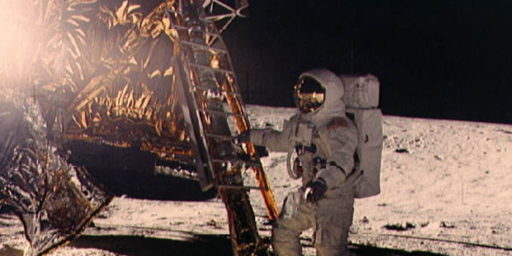
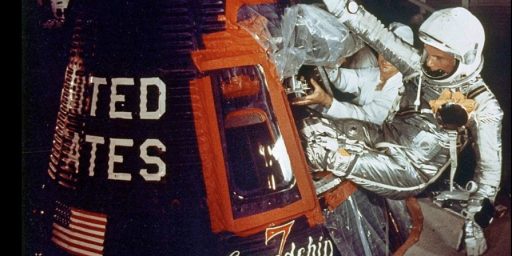
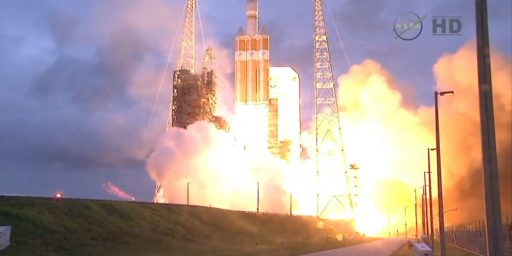
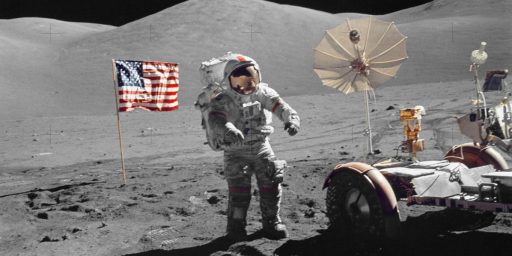
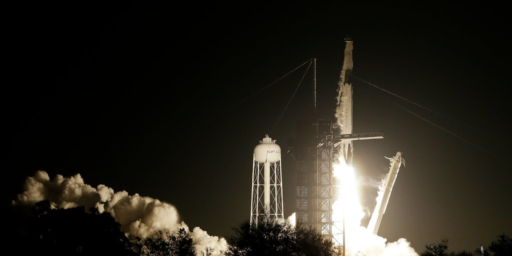
Don’t you know the space program was all faked? (I’m kidding)
It is amazing what NASA was able to accomplish in a period prior to computer assisted design and modeling. And it is rather humbling the bravery of those very first astronauts 9whether Russian or American).
They made real contributions to mankind, beyond the ways that every person influences the lives around them.
Godspeed, Schirra.
I worked on the ground crew at an aviation Fixed Base Operator in Oklahoma City for 20 years. Over the years I saw a great deal of celebrities up close and personal, and I was never impressed with them, however I saw several astronauts, Schirra included, and I will say that I was awe-inspired by them. I’m 44 years old and my generation is the last to appreciate space exploration in it’s early days. Thanks Wally, and God bless.